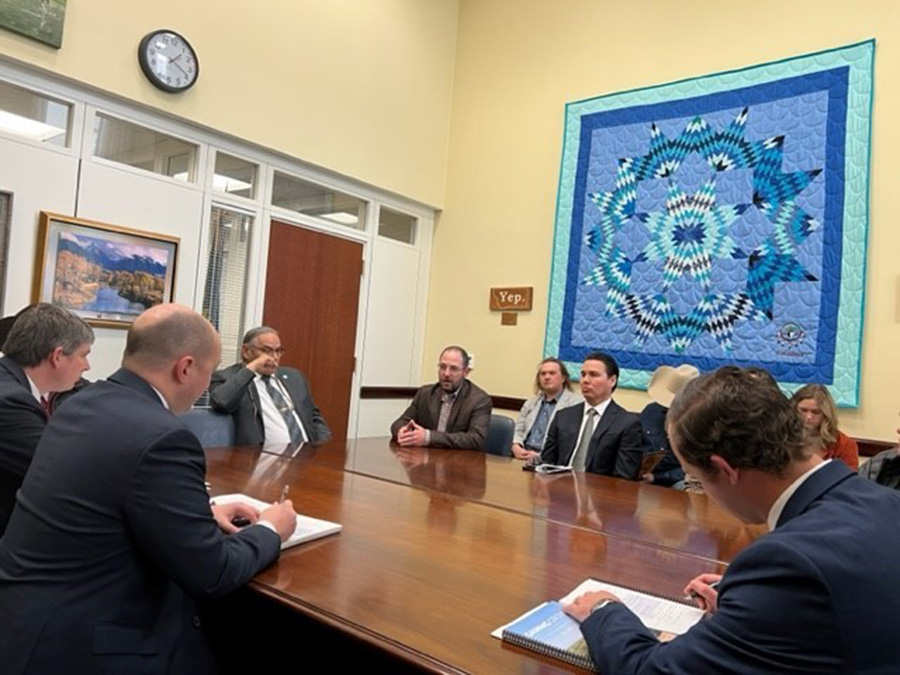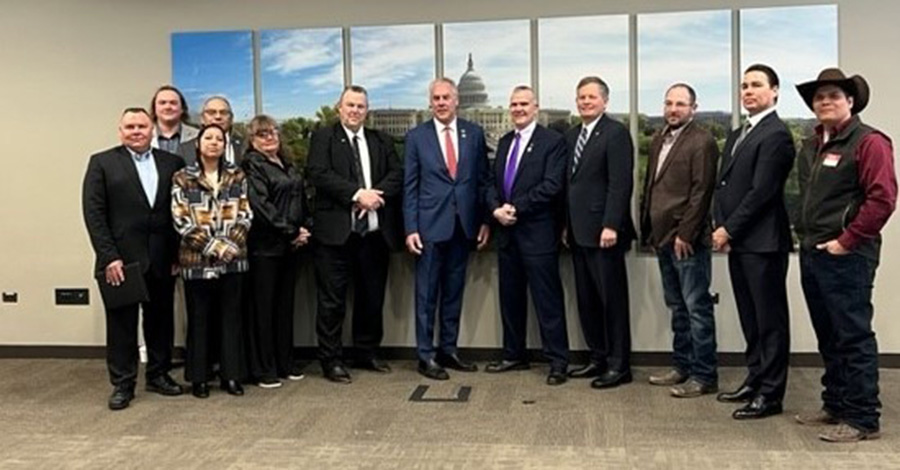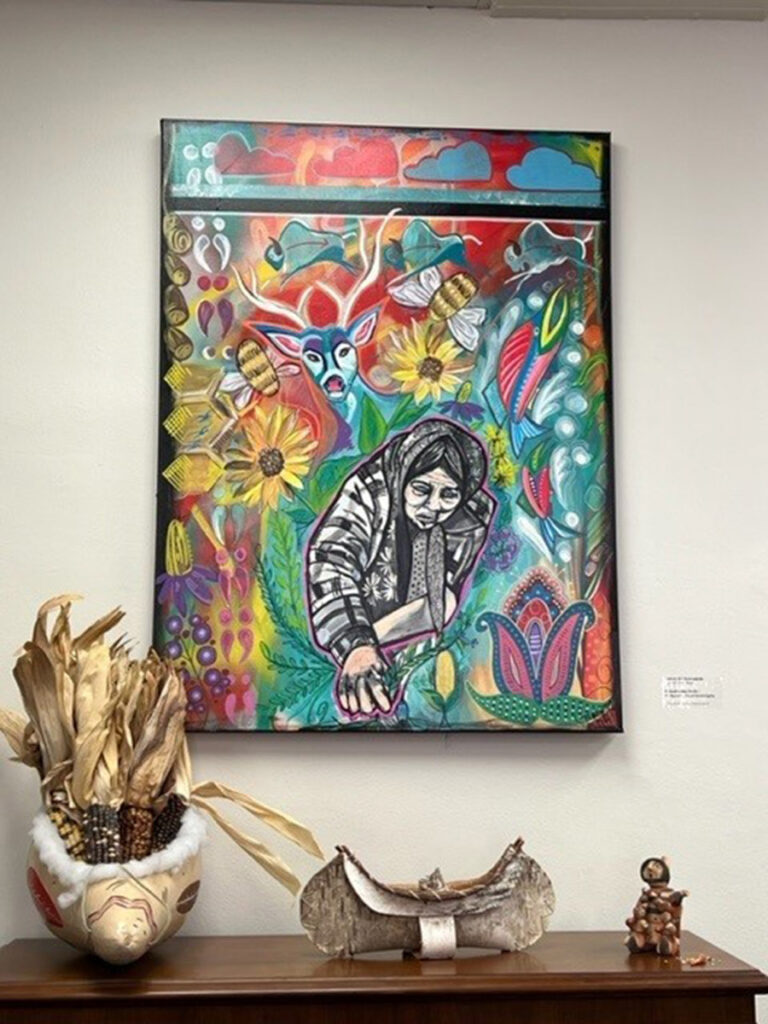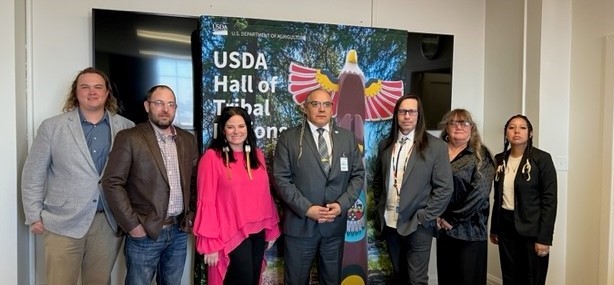Photo: USDA OTR (left to right): Will Seeley (Indigenous Food and Agriculture Initiative, Helena, MT), Ryan Lankford (Fort Belknap Indian Community producer, Ag Committee Chairman), Heather Dawn Thompson (Cheyenne River Sioux Tribe, Director, USDA Office of Tribal Relations), COLT Chairman Marvin Weatherwax (Blackfeet Tribal Business Council); Reed Robinson (Sicangu/Lakota, Director, U.S. Forest Service Office of Tribal Relations), April Martin (Northern Cheyenne producer), Michaela Red Cherries (Blackfeet Nation counsel)
February 28-March 2, COLT joined the Native Farm Bill Coalition to advocate for great tribal inclusion in the 2023 Farm Bill, as set forth in COLT Resolution: 10-19-2022 Resolution # 01-2022 (WR-Las Vegas).

COLT focused on priorities that support tribal self-determination, food sovereignty and more local control of monies reaching reservations through Farm Bill programs. These priorities include:
- Application of the Buy Indian Act for all federal food-related purchases on Indian reservations or for Native communities.
- Billions of dollars annually go to school lunch programs, WIC, elderly food security programs, food stamps, and commodities programs on and near reservations . But not $1 of those billions has attached Indian preference. This statutory expansion would direct billions of dollars into tribal communities and support tribes’ self-determination.
- Indian preference hiring for all USDA jobs on or near Indian reservations or serving Native communities.
- There is a USDA office in every county in the United States, including Rural Development, FSA and NRCS offices. Hundreds of jobs are in these offices, but there is no Indian preference, even on reservations. Consequently, there are few, if any, Natives serving in USDA roles on reservations.
- COLT calls on OMB to support this statutory expansion.
- Full contracting authority under the 1975 Indian Self-Determination and Education Assistance Act, Pub. L. 93-638 for the Food Distribution Program on Indian Reservations (FDPIR).
- Full contracting authority under the 1975 Indian Self-Determination and Education Assistance Act, Pub. L. 93-638 for all U.S. Forest Service functions on or near Indian reservations.
- Amend USDA’s Fractionated Indian Land Program and the Indian Tribal Land Acquisition Program to make them:
- Grants or fixed low-interest loans (1%) with no collateral requirements available to tribes and Native individuals.
- Native agriculture projects routinely cannot “pencil-out” under USDA’s burdensome requirements. When there is no commercial motivation for the activity, but rather food and nutrition, repayment of a loan is impracticable.
- Allowable for conservation use
- Again, motivations are in issue in current program disinterest. Tribes might want to acquire land for bison management or to secure subsistence animal migration routes — having nothing to do with revenue generation and having no attendant potential revenues as collateral.
- Allowable for off-reservation acquisitions.
- There is no good policy reason to limit these programs to on-reservation acquisitions. Tribes have much broader traditional territories and Treaty boundaries that often contain preferable agricultural lands.
- Grants or fixed low-interest loans (1%) with no collateral requirements available to tribes and Native individuals.

COLT leaders, producers and advocates from the Blackfeet Nation, Crow Tribe, Fort Belknap Indian Community, Northern Cheyenne Tribe, Spirit Lake Nation, and Cheyenne River, Oglala and Rosebud Sioux Tribes met with the offices of Senators Daines, Tester, Rounds, Thune, Cramer, Hoeven and Murkowski, and Reps. Armstrong, Johnson, Rosendale, Zinke, as well as several USDA offices, along with the InterTribal Buffalo Council, Intertribal Agriculture Council, and Indigenous Food and Agriculture Initiative. They were able to share their thoughts about current barriers for Tribes and Native producers and ideas for positive change in the 2023 Farm Bill.


